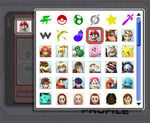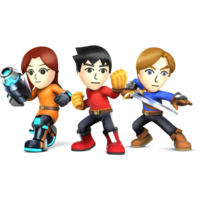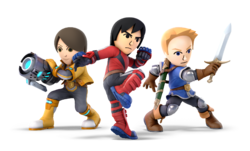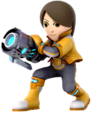| Welcome to SmashWiki! Log in or create an account and join the community, and don't forget to read this first! |
| Notices |
|---|
| SmashWiki will be experiencing a server migration on April 16th, 2025, expected to begin at 7:00 am (EDT) and lasting for up to 12 hours. The wiki may be entirely unavailable during that time. |
Mii: Difference between revisions
No edit summary |
Aidanzapunk (talk | contribs) m (Undid edit by SpSm08: ) Tag: Undo |
| (4 intermediate revisions by 3 users not shown) | |
(No difference)
| |
Latest revision as of 23:03, January 16, 2025
- For fighter info, see Mii Fighter (SSB4) and Mii Fighter (SSBU).
- For the universe, see Mii (universe).
| Mii | |
|---|---|
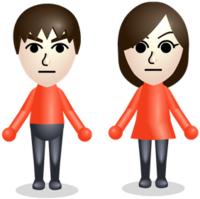 
Official render of the default male and female Mii from Mii Channel. | |
| Universe | Mii |
| Debut | Mii Channel (2006) Wii Sports (in-game, 2006) Super Smash Bros. for Nintendo 3DS (as Mii Fighters, 2014) |
| Smash Bros. appearances | SSB4 Ultimate |
| Most recent non-Smash appearance | WarioWare: Move It! (2023, cameo) |
| Console/platform of origin | Wii |
| Species | Mii (based on Human) |
| Gender | Varies |
| Place of origin | Mii Plaza |
| Created by | Yamashita Takayuki |
| Voice actor | ♂: Yūji Kishi Takashi Ōhara Ryōtarō Okiayu Michihiko Hagi Hideo Ishikawa Kiyoyuki Yanada ♀: Umeka Shōji Ayumi Fujimura Makiko Ōmoto Minami Takayama Kimiko Saitō |
| Article on MiiWiki | Mii |
A Mii is a personal digital avatar character that players can create and use in certain Nintendo games. Miis were introduced for the Wii alongside the system's launch late in 2006, and have since appeared for use on the Nintendo 3DS, Wii U, Nintendo Switch, and even certain Nintendo DS titles and mobile apps. Miis often make cameo appearances - playable or not - in Nintendo games and are sometimes the focal point, such as software like StreetPass Mii Plaza and the Tomodachi series, and gained representation in the lineup for Super Smash Bros. 4, and later Super Smash Bros. Ultimate, eight years after their original introduction.
Origin[edit]
Miis debuted along with the Wii in late 2006. They can be created using the Wii's Mii Channel application, and users are able to customize many aspects of their appearance and facial features, such as their height, hairstyle, and eye color to resemble friends, family, and celebrities, or - with creative enough use of the provided facial parts - animals, fictional characters, and inanimate objects. Once created, Miis act as avatars for players in a variety of titles, including both first party releases such as Wii Sports and Mario Kart Wii and third party titles such as Sonic & Sega All-Stars Racing and Jeopardy!, and as a way of keeping track of individual players' scores. Miis saved onto a console are also capable of appearing as NPCs in games, usually acting as bystanders or spectators. Players could also save Miis onto their Wii remote and transfer them to another player's Wii, or submit them online using the Check Mii Out Channel. While initially exclusive to the Wii, Miis would also see use in a few Nintendo DS games (the most notable example being the Japan-exclusive Tomodachi Collection), and later in several games on the Nintendo 3DS and Wii U, with the latter two being made using the Mii Maker application preinstalled on the system. The 3DS Mii Maker would introduce the ability to save a Mii as a QR Code to share on any website and download using the camera. Miis would return on the Nintendo Switch, but were made less of a focal point within games themselves early in the system's lifespan, with Super Smash Bros. Ultimate being one of the first to include Miis within the gameplay. Color choices were greatly expanded on, and Miis were available from launch as options for profile icons with a variety of facial expressions and poses. Later games such as Mario Golf: Super Rush and Miitopia once again saw Miis as focal playable entities, with the Switch version of Miitopia introducing a highly robust Mii creation studio. Miis also returned as playable characters in Nintendo Switch Sports, though they were no longer the default characters of the game, that role being taken by a new set of characters known as "Sportsmates", which have more outfits and hairstyles available than Miis, and provide the option to play as anthropomorphic animals, but also have streamlined facial features.
In Super Smash Bros. Brawl[edit]
While not playable, any Miis saved on the Wii console could be used as personal icons in the game's Friend Roster.
There exist multiple rumors on the inclusion of Miis in Brawl, with most claiming that Masahiro Sakurai did not want Miis in the game, saying "They have an innocent charm to them that could be ruined if they were in a fighting game." No website or print source, however, is known to corroborate these claims. This quote was, however, used when explaining why Villager or another Animal Crossing character wasn't added in Brawl.
During E3 2014, when introducing the Mii Fighters, Sakurai claimed that Miis were considered as potential playable characters in Brawl, but were ultimately not included because "it didn't seem right at the time for Miis to be punching and kicking".[1]
In Super Smash Bros. 4[edit]
As a playable fighter[edit]
Miis, under the name of Mii Fighters, are customizable fighters in Super Smash Bros. 4. They can be one of three types: the Gunner, which places emphasis on long-range attacks; the Brawler, with its close-range fighting style, fast movement, and powerful physical strikes; and the Swordfighter, the weapons master. Each of the three types has access to twelve unique special moves, and can also be customized with different clothes and accessories.
The height and width of the Miis used also determines their attributes in game. Smaller/skinnier Miis are faster (having better mobility and less ending lag on their attacks) in exchange for having less range, being slightly lighter and dealing slightly less damage, while bigger/wider Miis are slower (having worse mobility and more ending lag on their attacks) in exchange for having more range, being slightly heavier and dealing slightly more damage. Smaller Miis are considered to be the most effective overall, as their greater speed more than makes up for their largely minor shortcomings in comparison with larger Miis. Small Mii Brawler in particular was considered to be a very strong character as the character was small, had incredible mobility and they had a very strong combo game which along with their custom moveset, could easily allow them to KO opponents at very low percents from a grab combo. On the flipside, larger Miis are considered to be the least effective, as their slower speed and larger size are much more detrimental than the minor advantages they gain. After EVO 2015 however, only the default sized Miis have generally been allowed in tournaments.
On the fourth and current tier list, which does not take custom special moves or sizes into account, the Mii Fighters are unranked, though, on the previous tier list, Mii Gunner, Mii Brawler, and Mii Swordfighter ranked 54th, 56th, and 57th respectively. Mii Brawler possesses good mobility, attack power and speed, yet has a lackluster reach and poor recovery. Mii Gunner has generally quick attacks and high reach, especially with its forward smash and up aerial, yet has a terrible grab game due to a lack of damage and an inability to start combos, along with mediocre mobility and a lack of ranged KO options. Mii Swordfighter has a disjointed range, quick grab, and versatility in its various special moves, but suffers from a lag-filled moveset and difficulty in KOing. However, the biggest drawback the Mii Fighters had for most of the game's lifespan is the banning of custom moves in most tournaments (along with restricting Miis to only be their default size), which was in effect for most tournaments throughout the game's life. Due to this, they were often forced to use only their default movesets with their default size, rendering their viability poor. Some tournaments late in the game's life did allow Miis to use their custom moves (such as Super Smash Con events starting from 2018) but this was too little too late for the Miis (and they were still restricted to their default size). As a result, all three Mii Fighters have some of the worst tournament representation out of the game's entire roster.
Stage appearances[edit]
Mii characters also appear in the background of several stages. In these cases, the Miis featured can either be those already on the console, or random Miis generated by the game.
- Find Mii: As in the game of the same name, players' Miis appear in cages.
- Pilotwings: Miis appear in the background of the stage, flying using Rocket Belts.
- Tomodachi Life: Miis may appear in the rooms behind the fighters.
- Wuhu Island: Miis appear in the background of the stage playing minigames.
In Multi-Man Smash[edit]
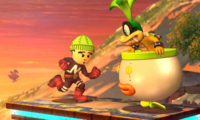
Additionally, Mii Fighters appear as enemies (under the name "Fighting Mii Team") in the game's Multi-Man Mode, as well as the retooled Classic Mode. Succeeding the Fighting Alloys from Brawl, members of the team are taken from Miis in the player's Mii Maker, though randomly generated Miis are also present in the mode. All Miis featured as Mii Fighters are randomly chosen to be Brawlers, Swordfighters, or Gunners, but they cannot use special moves or grab ledges.
Mii Fighters have a unique costume when fought as part of the Fighting Mii Team, consisting of a black shirt with a large, white M on it, as well as stylized trousers featuring some stripes shaped like the lowercase letter I. These Mii Fighters also do not change facial expression when attacking or attacked, as if the Mii faces are nothing more than masks.
In Smash Tour[edit]
Miis are used as the players' tokens in the board game-like mode, Smash Tour, simply being used to move around between spaces and collect pick-ups. They appear to wear the same outfits that they do in the Mii Maker as opposed to their standard Mii Fighter uniforms, though they will wear a shirt that is either red, blue, green or yellow depending on their port colour. The Miis that are automatically loaded as representatives for CPUs are chosen at random, and the chances of a Guest Mii being chosen depends on how many Miis have been created on the console in question.
Trophies[edit]
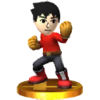
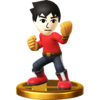
- Mii Brawler
This fighter is based on a player's Mii. It excels at fighting with punches and kicks. This type of Mii is very agile, blending attacks with movement to get the battle flowing. It has superior dash and jump compared to other types. Stay close and keep whaling on foes—you'll KO them in no time!
A fighter based on your Mii! Brawlers focus on kicks and punches, and a lot of their specials send them hurtling towards opponents. They're better at dashing and jumping than other types of Mii Fighter, and their speedy attacks really pile on the pressure at close range. And, just for good measure, they can also lob shot-puts!
: Super Smash Bros. for Wii U
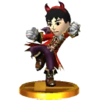
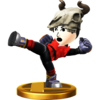
- Mii Brawler (Alt.)
 Shot Put is the only projectile attack a Mii Brawler can have. It drops quickly and only bounces a tiny bit. Try using it on foes hanging off an edge to knock them off. The down special Head-On Assault can bury enemies in the ground. It also sends the Mii Brawler downward—don't KO yourself, too!
Shot Put is the only projectile attack a Mii Brawler can have. It drops quickly and only bounces a tiny bit. Try using it on foes hanging off an edge to knock them off. The down special Head-On Assault can bury enemies in the ground. It also sends the Mii Brawler downward—don't KO yourself, too! Shot Put is the only projectile attack a Mii Brawler can have. It drops quickly and bounces only a tiny bit. Try using it on foes hanging off edges to knock them off. The down special Head-On Assault can bury enemies in the ground. It also sends the Mii Brawler downward—don't KO yourself too!
Shot Put is the only projectile attack a Mii Brawler can have. It drops quickly and bounces only a tiny bit. Try using it on foes hanging off edges to knock them off. The down special Head-On Assault can bury enemies in the ground. It also sends the Mii Brawler downward—don't KO yourself too!Shot-Put is the only projectile attack a Mii Brawler can have. It drops quickly and only bounces a tiny bit. Try using it on foes hanging from the stage to knock them off. The down special Head-On Assault can bury enemies in the ground. It's also a kind of meteor smash, but if you use it while off the stage, you'll probably KO yourself, too.
: Super Smash Bros. for Wii U
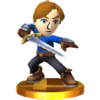
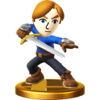
Mii Swordfighter
Mii Sword Fighter
This fighter is based on a player's Mii and favors a sword in battle. Enjoy the extra reach the sword offers, but remember that it takes a bit longer for strikes to reach your opponent as a result. Customize your Mii with chargeable moves, counters, or projectile attacks.
A fighter based on your Mii! The main draw of Sword Fighters is the extra reach they get thanks to their swords. On top of that, they have a lot of varied moves to choose from. Unfortunately, a lot of sword attacks have a bit of delay between pressing the button and landing the attack, so you'll need to be very careful not to leave yourself open!
: Super Smash Bros. for Wii U
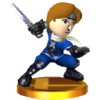
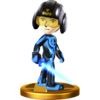
Mii Swordfighter (Alt.)
Mii Sword Fighter (Alt.)
One of the Mii Swordfighter side specials actually uses a throwing disc called a chakram! How quickly you press your desired direction controls how fast and far the chakram flies and how much damage it does. Several other moves, like Skyward Slash Dash, also work in this manner.
One of the Mii Sword Fighter side specials actually uses a throwing disc called a chakram! How quickly you choose a direction controls how far and fast the chakram flies, as well as the kind of damage it does. This kind of quick-aiming action also applies to other special moves, like Super Slash Dash.
: Super Smash Bros. for Wii U
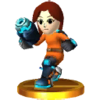
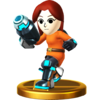
- Mii Gunner
A Mii sporting a blaster arm, this fighter is a great choice for those who prefer to fight the battle from a distance. The Mii Gunner has a lot of special projectile moves available, so pick your favorites and use them when needed. Don't forget about standard and smash attacks!
A fighter based on your Mii! Gunners are all about the guns, of course. No matter how you set up your specials, you'll end up with a powerful arsenal. And it's not just their special moves that have excellent range – they have standard and smash attacks that can really go the distance too. Use them to dominate the battle from afar.
: Super Smash Bros. for Wii U
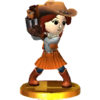
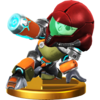
- Mii Gunner (Alt.)
 One of the Mii Gunner's side specials is Stealth Burst. The missile blends in, making it tough to see. Plus, you can control when it explodes, so it's handy for surprise attacks! You could also use Absorbing Vortex to absorb damage done to you by energy weapons. This is one fighter with a lot of tricks up its sleeve!
One of the Mii Gunner's side specials is Stealth Burst. The missile blends in, making it tough to see. Plus, you can control when it explodes, so it's handy for surprise attacks! You could also use Absorbing Vortex to absorb damage done to you by energy weapons. This is one fighter with a lot of tricks up its sleeve! One of the Mii Gunner's side specials is Stealth Burst. The missile blends in, making it tough to see. Plus, you can control when it explodes, so it's handy for surprise attacks! You can also use Absorbing Vortex to absorb damage done to you by energy weapons. This is one fighter with a lot of tricks up its sleeve!
One of the Mii Gunner's side specials is Stealth Burst. The missile blends in, making it tough to see. Plus, you can control when it explodes, so it's handy for surprise attacks! You can also use Absorbing Vortex to absorb damage done to you by energy weapons. This is one fighter with a lot of tricks up its sleeve!One of the Mii Gunner's side specials is Stealth Burst. The burst blends in, making it tough to see. Plus, you can control when it explodes, so it's handy for surprise attacks! You could also use Absorbing Vortex to absorb damage done to you by energy weapons. This is one fighter with a lot of tricks up its sleeve!
: Super Smash Bros. for Wii U
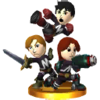
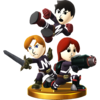
- Fighting Mii Team
These weak fighters show up in droves in Multi-Man Smash. There are Brawler, Swordfighter, and Gunner types. Since they're based on the Mii characters saved on your Nintendo 3DS system or Wii U console, you could end up battling friends and family! Don't get soft—just take them out! Almost any attack does the trick.
These weak fighters show up in droves in Multi-Man Smash. There are Brawler, Sword Fighter and Gunner types. Since they're based on the Mii characters saved on your Nintendo 3DS system or Wii U console, you could end up battling friends and family! But forget that – just take them out! Any strong-ish attack does the trick.
: Super Smash Bros. for Wii U
In Super Smash Bros. Ultimate[edit]
As a playable character[edit]
Miis return in Ultimate. Their proportions have been altered so that they have smaller heads, and they now have 12 different voices to choose from. They are once again customizable characters but are now the only ones with this distinction, and the height and width of the Miis used no longer affects their in game stats. Mii Fighters can choose from one of three special moves for each slot, some of which are new or altered from their SSB4 counterparts. Additionally, unlike the previous game, each Mii Fighter class is selected separately on the character select screen instead of sharing a slot, unless the character select screen is set to stack Echo Fighters.
Stage appearances[edit]
Miis reprise their role as background characters on Tomodachi Life, Find Mii, Pilotwings and Wuhu Island.
In Mob Smash[edit]
The Fighting Mii Team once again appears as the opponents in the game's Multi-Man mode, Mob Smash.
Spirits[edit]
Fighter spirits[edit]
Support spirit[edit]
| No. | Image | Name | Class | Cost | Ability | Series |
|---|---|---|---|---|---|---|
| 1,088 | Plane | ★★ | 1 | Strong-Wind Resist | Pilotwings Series |
Names in other languages[edit]
Mii Fighter[edit]
Mii Brawler[edit]
Mii Swordfighter[edit]
Mii Gunner[edit]
Trivia[edit]
- Mii Fighters do not appear in All-Star Mode, making them the first and only playable characters with this distinction.
- As mentioned above, Miis do not actually originate from a game. They share this trait with R.O.B.; however, Miis debuted in software that is compatible with games starring Miis, such as Wii Sports, Miitopia, and Tomodachi, whereas R.O.B. debuted as a peripheral for two games that do not star R.O.B. himself.
- They are the first playable fighters with the Super Smash Bros. insignia.
- Mii Fighters are the only characters to start off voiceless and gain a voice in the next game.
- They can, however, remain voiceless in Ultimate, should the player choose to leave their Mii Fighter without one.
- In some languages, Mii Fighters have two different names to refer to the male and female versions. Villager, Wii Fit Trainer, Inkling, Byleth, and Pokémon Trainer also share this trait.
- In Ultimate, the Mii Fighters have the most voice actors of any character in the series.
- They also share the most voice actors that have voiced a veteran in the series, with a total of 9, including:
- Michihiko Hagi, Yuji Kishi, Takashi Ohara, Kiyoyuki Yanada, Hideo Ishikawa, Ayumi Fujiwara, Makiko Omoto, and Minami Takayama, the Japanese voice actors of Ike, Ken, Fox, Richter, Simon, Zelda/Sheik, Kirby/Ness, and Pit/Dark Pit, respectively.
- In addition, Ryotaro Okiayu voices the Assist Trophies Zero and Alucard in the Japanese version.
- They also share the most voice actors that have voiced a veteran in the series, with a total of 9, including:
References[edit]
| show Playable characters |
|---|
| show Background characters |
|---|
| show
|
|---|
| show
|
|---|
